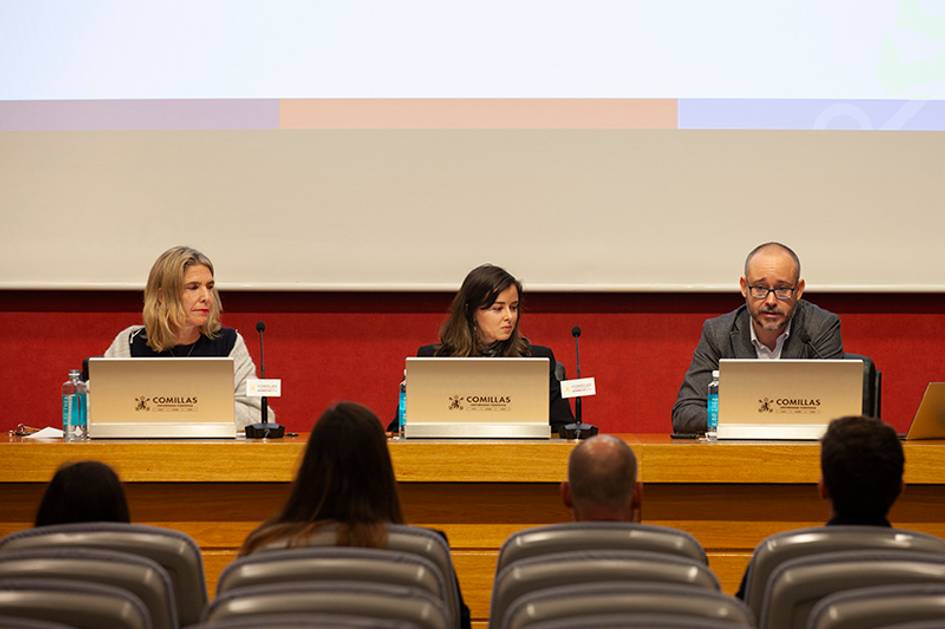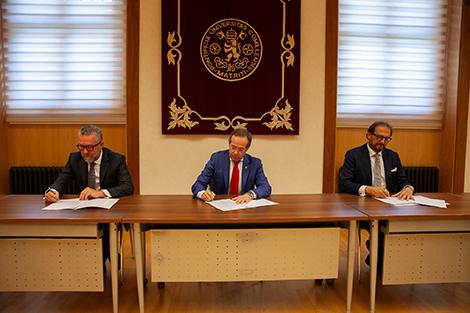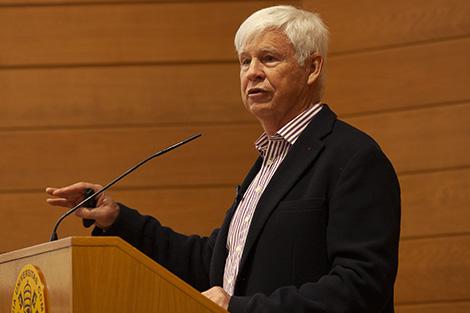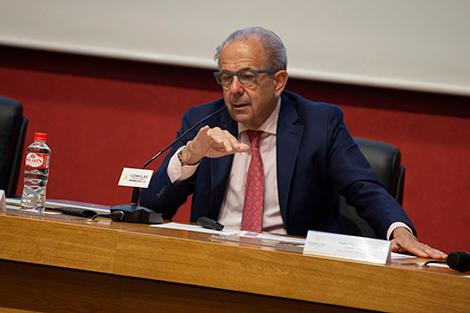What does the success of renewable hydrogen in Spain depend on?
The first Annual Report on Hydrogen is presented at Comillas, which shows the state of this energy vector in Spain and the factors for its development

Iria Basanta, head of section at the Subdirectorate General for Hydrocarbons and New Fuels of the Ministry for Ecological Transition and the Demographic Challenge (centre), flanked by the co-directors of the Chair of Hydrogen Studies, Isabel Figuerola-Ferretti and Rafael Cossent.
27 October 2023
The Chair of Hydrogen Studies has just presented the second edition of its annual Hydrogen 2023 Report, which examines the success factors for the development of renewable hydrogen in Spain. The report provides a snapshot of the sector with the aim of contributing to the debate with an updated review of regulatory developments and their implications for project development at present, as well as the prospects for hydrogen trade in the medium and long term.
This report -whose presentation was attended by Iria Basanta, Head of Section at the Subdirectorate General for Hydrocarbons and New Fuels of the Ministry for Ecological Transition and the Demographic Challenge-offers a comprehensive perspective on some key aspects for the successful transition to a hydrogen economy. For Rafael Cossent, co-director of the chair, "the report highlights that achieving a viable business model for renewable hydrogen is complex and requires consideration of the entire supply chain, as well as economies of scale in each link of the chain".
In this sense, the co-director of the chair, Isabel Figuerola Ferretti, says that the incentives to encourage demand are few compared to those created to support its production. "This is important because for hydrogen to become a competitive vector it is essential to achieve economies of scale in its production processes, and this will only be possible if demand is guaranteed, the development of which will benefit from the creation of the hydrogen market with the appropriate price signals.
According to the report, last year saw a 30% growth in the number of projects related to hydrogen production. This brings the projected electrolysis capacity to 16.5GW, significantly higher than the 11GW target set in the recent revision of the PNIEC. However, as of today, more than 90% of this capacity is still in the early stages of development. The electrolytic power in operation is around 30MW and, in 2022, only 2,810 tonnes of renewable hydrogen were produced in Spain, which represents 0.46% of the total hydrogen consumed in that period.
The report's data show that there is still a great deal of interest in promoting renewable hydrogen projects in Spain, although few of them have reached advanced stages of development. "The sector that has attracted the most new electrolysis capacity is the production of hydrogen derivatives for maritime transport," says Cossent.
Professor Figuerola-Ferretti argues that we can learn a lot from the development of the liquefied gas market to design the system of guarantees required for the current renewable hydrogen business model. Another issue to take into account is the prices of renewable hydrogen, which "are closely linked to the price of electricity and, therefore, to the price of reference gas", Figuerola-Ferretti reminds us. The data also confirms that the renewable hydrogen market in some parts of the United States is much more competitive than in Europe, although preliminary data on the future prices of the Power Purchase Agreement show that Spain has a great competitive advantage over countries such as the Netherlands and Germany. For Cossent, "the report reveals that several countries have plans to export hydrogen to Europe, but the uncertainties in the medium and long term in relation to hydrogen transport and the materialisation of European demand mean that investments are risky for exporting countries". However, according to the Chair, Spain can benefit from its low cost of hydrogen production and offer a secure supply chain to European customers compared to global competitors.
The Chair of Hydrogen Studies is a collaboration between Comillas ICAI and the Faculty of Economics and Business Studies (Comillas ICADE), with the aim of contributing to the development of the renewable hydrogen sector in Spain through studies, data collection and analysis, dissemination and informed debate. To achieve its objectives, the Chair is supported by the participation of several sponsoring institutions present in different segments of the hydrogen value chain: Acerinox, Andersen, BBVA, Carburos Metálicos, Enagás, Cepsa Foundation, Management Solutions and Red Eléctrica de España.
You may also be interested in

La consultora se une a la Cátedra de Estudios sobre el Hidrógeno para facilitar la transición energética en España

Nobel Prize winner Robert Engle took part in a seminar organised by the Chair for Low Carbon Hydrogen Studies and Comillas ICADE

España podría ser líder en producción si se invierte lo necesario, según la Mesa del hidrógeno de Andalucía
